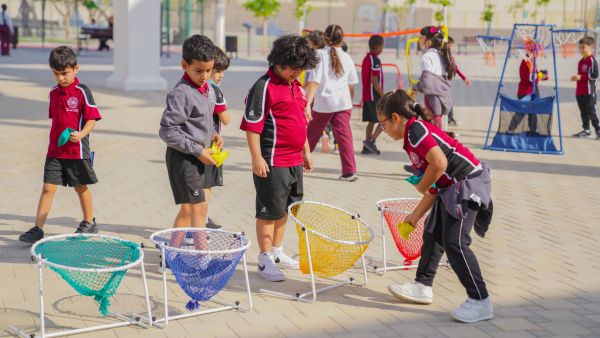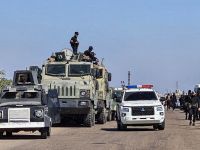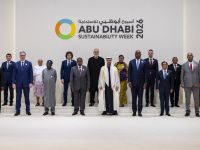How Traditional Games at a QF School Help Build National Identity

The classrooms and outdoor areas at Qatar Foundation’s Tariq Bin Ziad School vibrate with the voices of kids playing traditional games and chanting folk melodies taken from Qatar’s heritage – all part of the goal of revitalizing folklore and preserving national identity.
The school – part of Qatar Foundation’s Pre-University Education - offers the International Baccalaureate program, but while promoting national, Arab, and Islamic identity through Qatari heritage. As Maha Al-Romaihi, Director of Tariq Bin Ziad School, explains: “Tariq Bin Ziad School is unique in the sense that it combines cultural values and local heritage with world-class education.”
"One of the most important things we do in our school is to strengthen national identity through academic content and traditional games, to produce global citizens, but global citizens with a local spirit and a strong national identity."
Al-Romaihi explained that the school has been working to promote and celebrate the Qatari dialect, as students at private schools, or in QF schools that follow an international curriculum, speak English instead of using Standard Arabic, and this mean students can move away from using the local Qatari dialect.
"The Qatari dialect has not disappeared, but it is not used enough,” she said, “so we seek to strengthen it. And we have found that we can do this by integrating it into the curricula and the school community in a thoughtful and systematic manner and using it as an entry point for teaching Arabic.
"Through the initiative we launched, the Qatari local dialect is strengthened through old traditional games and chants, and national and traditional songs, and we are focusing on encouraging students to use the Qatari dialect during and outside classes, in breaks and after-school activities, to preserve it, cherish it, and teach it to future generations and cherish it.”
Al-Romaihi highlighted that. during Arabic language classes, teachers link linguistic knowledge and words with their equivalents in the Qatari dialect. The school is also working on designing and preparing an illustrated dictionary of Qatari words that covers different fields.
Asmaa Al-Beraidi, National Curriculum Coordinator at Tariq Bin Ziad School, said: "We believe that using traditional games is a way of enhancing national identity and preserving the Qatari dialect, in addition to preserving the continuity of traditional games and Qatari heritage.
"When, at Tariq Bin Ziad School, we began to work on the initiative to enhance the Qatari dialect using games and traditional songs, we were not only satisfied with reviving this heritage, but we also sought to develop and integrate it in a way that fits with the courses we offer, to develop the skills of our students."
Al-Beraidi explained that when introducing traditional games to students, such as Al Saba, Al Khabsa, Taq Taq Taqya, Hedo Al Meslsal, the schools aims to ensure that these games have a role in developing basic skills for students – specifically language, social, physical, and emotional skills.
"The benefit that students get varies from one game to another,” she said. “For some, it teaches them the skill of sharing and cooperating with others, and for others, it teaches them patience, perseverance, responsibility, and accepting loss. Play also helps to develop their muscle and physical skills and increase their focus, and this is important in a time when children spend a lot of time on electronic devices."
Al-Beraidi pointed out that although the local Qatari dialect may differ in its vocabulary, it is supportive and complementary to the Arabic language, and the linguistic structure is the same. Consequently, when the student uses the Qatari dialect correctly, they will automatically become more skilled in using Standard Arabic.
"The dialect expresses us and is an important part of our identity,” she said. “When we preserve the Qatari dialect of students, we preserve their national identity and their Arabic language.”
Background Information
Qatar Foundation
Qatar Foundation (QF) is a non-profit organization made up of more than 50 entities working in education, research, and community development.
Our unique ecosystem—supported by partnerships with leading international institutions—is built on initiatives that address our most pressing challenges, create global opportunities, and empower people to shape our present and future.







